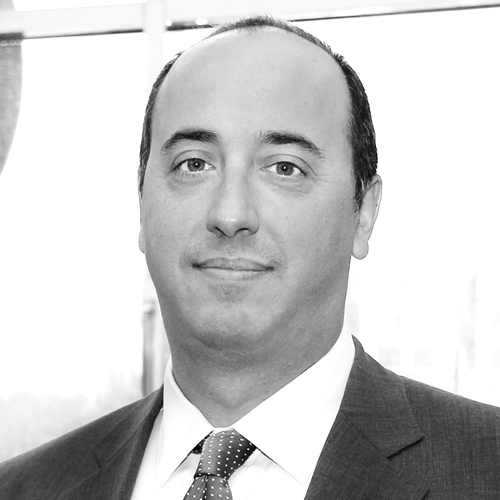Robert McKenzie spent much of his childhood in law firms. His parents operated a boutique tax controversy firm in Chicago, and he grew up working in the office. After graduating from the Illinois Institute of Technology’s Chicago-Kent College of Law, he followed in his parents’ footsteps, joining a boutique tax firm in Illinois.
McKenzie compares working as outside counsel with being in an ivory tower. “You’re never quite as far down in the weeds as the clients are. When you’re an in-house attorney, you’re shoulder to shoulder with the rest of the team,” McKenzie says. “It makes you become more of a strategist, as opposed to strictly a legal decision-maker.”
Now, McKenzie is the general counsel at ATI Physical Therapy, a company with an aggressive growth strategy. ATI opened its first clinic in 1996 and added a second location four years later. A third and fourth clinic soon followed. By the time McKenzie joined in 2012, the company operated 180 clinics and was doubling in size every eighteen months.

Historically, ATI’s expansion strategy has focused on acquisitions. Acquiring a company provides a foundation on which to build, but an established organization only comes with established norms. Transitioning staff to a new corporate philosophy and convincing clinicians to shift how they provide care can prove challenging for a healthcare company where the approach centers on providing exceptional customer service. ATI aims to make a patient’s experience in a clinic the best part of their day.
“The ATI Way is an overwhelming commitment to patient care that is disruptive within our industry,” McKenzie says. Clinical and regional directors attend leadership trainings and are made accountable for motivating their team members to deliver patient-centric service. But accountability does not only come from the top. When a clinic performs well, every staff member from the front desk attendant to the clinical director is rewarded for their exceptional customer service. “There’s a reason why when you go into some businesses, everybody’s happy,” McKenzie says. “It’s because they create a more positive customer-oriented atmosphere. That’s something that we embody here at ATI, full stop.”
In the past year, ATI has increased its emphasis on building new clinics. Opening new locations allows ATI to hire staff members who share the company’s vision, but finding qualified clinicians presents its own challenges. Physical and occupational therapy have traditionally been fractured industries, but as healthcare has become more highly regulated, smaller businesses have combined into larger groups. As the industry consolidates, competition for clinicians increases. “For the first time in the industry’s history, the bigger players are starting to regularly bump into each other due to staff members accepting positions with competitors,” McKenzie says. This can cause complications for hiring team members who are subject to noncompete agreements. For each new team member, the legal department must consider any noncompete agreements to determine whether the company can place the employee in the intended clinic.
ATI has a small legal department, and McKenzie works closely with outside counsel. For corporate matters, ATI hires larger law firms, but for more specialized issues, McKenzie returns to his roots in boutique law firms. He works with local advisors in each of the twenty-five states where ATI operates. This approach delivers state-specific guidance and decreases the legal department’s overall spending. “Over the years, we’ve increased our spend on boutiques overall while largely reducing our spend on big law to get us to that happy medium where we have the right tool deployed on the right job,” he says.
To ensure successful partnerships, McKenzie invests resources in developing long-term connections. He often spends weeks introducing outside counsel to ATI’s corporate structure, business mentality, risk tolerance, and customer service approach. “It takes a significant investment of time and effort to integrate new outside counsel and have them work with the company seamlessly,” he says. “We stick with those law firms that commit to understanding our business and honoring our customer service mentality.”
The laws governing patient care vary from state to state and from patient to patient, depending on their insurer. To guarantee that patients receive the proper care, the legal and compliance departments have established state- and patient-specific care guidelines, which they operationalize through a custom EMR system. “Within the industry, there was not a commercial product available that could pivot and grow as fast as we needed it to,” McKenzie says. “So, we built our own.”
The records system has an electronic health chart for each patient, with a series of data entry fields where clinicians record the details of a given visit. Through labels and color-coding, the program indicates the patient’s status to the clinician and the rules the patient is subject to. The system has built-in compliance and safety measures that flag potential data entry mistakes. If the clinician checked the wrong box for a given patient, the system will highlight the information. “It’s the clinician who’s the ultimate decision-maker as to how they document the care, but we prompt them and drive real-time error checking through our system,” McKenzie says.
These streamlined compliance measures lay the foundation for ATI’s continued growth. The company now operates more than 750 clinics, with new locations opening frequently. Looking ahead, McKenzie is developing holistic approaches to contract management and considering how to grow the legal department—all while maintaining his focus on patient-centered care and ethical growth. “There’s plenty of press out there about companies that don’t do it right,” McKenzie says. “Our goal is to never be that headline. We’re going to do it right.”
Photo: Sam Rood


